
Mastering the Language of Work: The Indispensable Role of Job Vocabulary Worksheets
In today’s fiercely competitive job market, possessing the right skills and experience is undoubtedly crucial. However, often overlooked but equally vital is the command of specialized vocabulary – the language of the workplace. From crafting a compelling resume to acing an interview and navigating daily professional interactions, a robust job-specific lexicon can be the differentiating factor between merely participating and truly excelling. This is where job vocabulary worksheets emerge as an indispensable tool, offering a structured and effective pathway to linguistic mastery in the professional realm.
This comprehensive article will delve into the profound significance of job vocabulary, explore the myriad benefits of utilizing job vocabulary worksheets, outline various types and formats, and provide guidance on how to design and effectively integrate them into both self-study and classroom settings.
The Crucial Role of Job-Specific Vocabulary
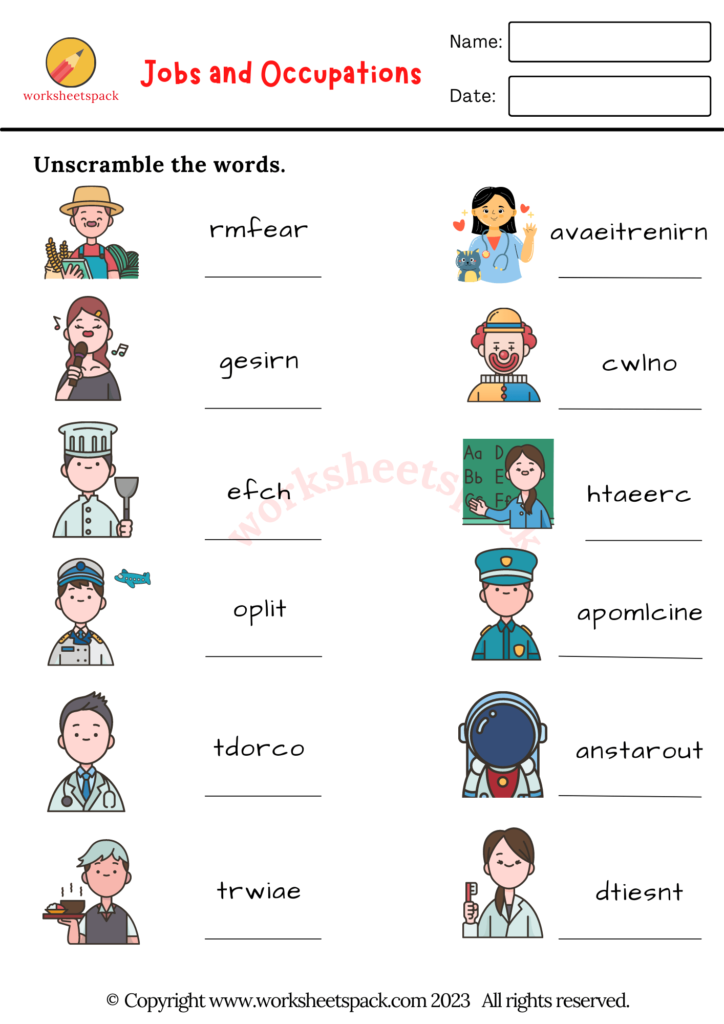
The world of work is a unique ecosystem with its own jargon, nuances, and communication protocols. Whether you are a fresh graduate entering the workforce, an experienced professional seeking career advancement, or an English as a Second Language (ESL) learner aiming for global opportunities, a strong grasp of job vocabulary is non-negotiable for several reasons:

- Job Search Efficacy: Understanding job descriptions requires familiarity with terms like "proven track record," "cross-functional teams," "synergy," "KPIs (Key Performance Indicators)," and "ROI (Return on Investment)." Without this understanding, candidates might misinterpret requirements or miss out on suitable opportunities. Similarly, crafting effective resumes and cover letters demands the use of action verbs (e.g., "managed," "developed," "implemented," "analyzed") and industry-specific keywords that Applicant Tracking Systems (ATS) are programmed to detect.
- Interview Success: Interviews are essentially high-stakes conversations. Candidates are expected to articulate their skills, experiences, and career aspirations using precise and professional language. Being able to confidently discuss "core competencies," "value propositions," "conflict resolution," or "strategic initiatives" can significantly impress recruiters. Conversely, stumbling over terms or using informal language can undermine credibility.
- Workplace Communication and Collaboration: Once employed, effective communication is paramount for daily operations. This includes understanding instructions, participating in meetings, writing professional emails, and collaborating with colleagues. Terms like "agenda," "minutes," "deadline," "budget allocation," "performance review," and "onboarding" are commonplace. Misunderstandings due to vocabulary gaps can lead to inefficiencies, errors, and strained professional relationships.
- Professional Development and Networking: To stay relevant and advance, professionals must engage with industry publications, attend conferences, and network. These activities are rich in specialized terminology. A strong vocabulary facilitates comprehension, enables meaningful participation in discussions, and helps build a professional identity.
- Building Confidence: There’s an undeniable link between language proficiency and self-assurance. When individuals feel confident in their ability to understand and use professional language, they are more likely to participate actively, express their ideas clearly, and project a competent image, which in turn fosters growth and success.

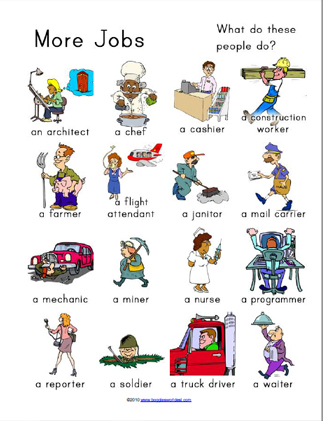
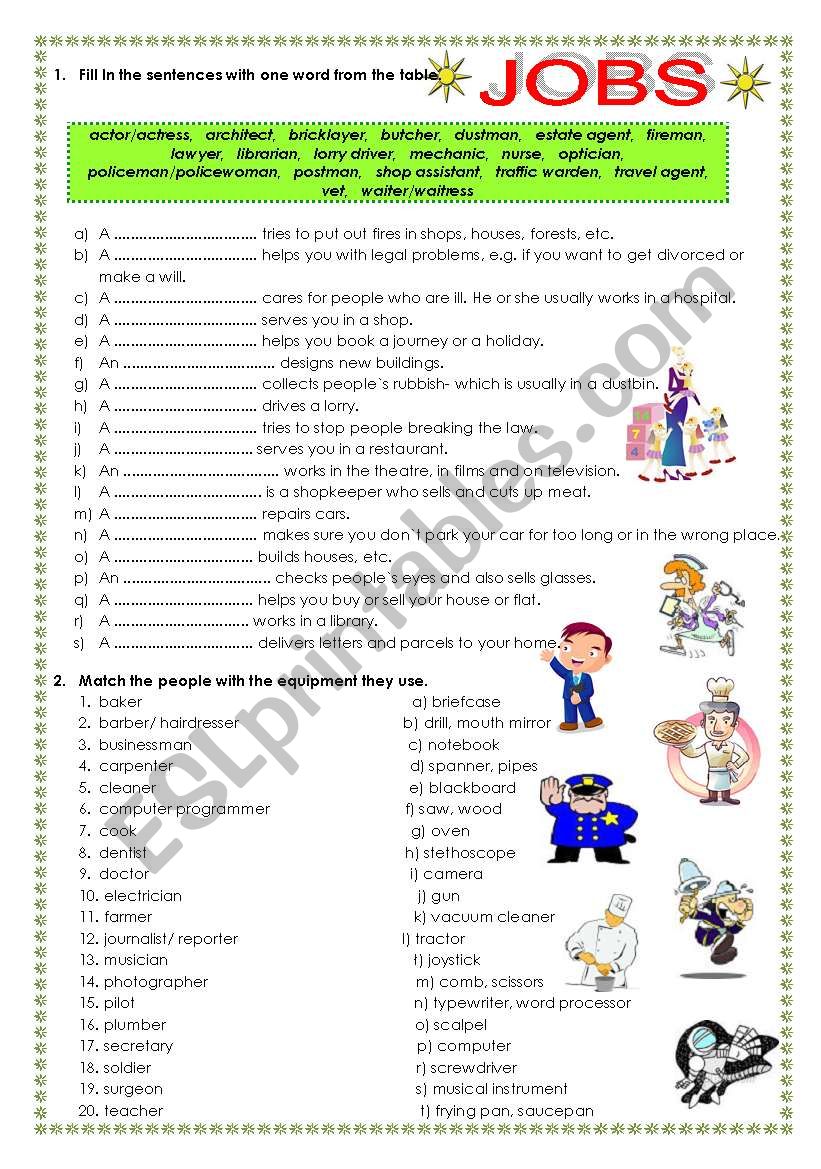
Unpacking the Benefits of Job Vocabulary Worksheets

Given the critical importance of job-specific vocabulary, how can individuals effectively acquire and internalize it? This is precisely where job vocabulary worksheets shine, offering a structured, interactive, and highly effective learning methodology. Their benefits are manifold:
- Targeted Learning: Unlike general vocabulary exercises, job vocabulary worksheets are specifically designed to focus on words and phrases relevant to the professional world. This targeted approach ensures that learners are acquiring practical, immediately applicable knowledge, saving time and maximizing learning efficiency.
- Active Engagement: Worksheets move beyond passive reading. They demand active participation through exercises like matching, fill-in-the-blanks, crosswords, and sentence construction. This active engagement strengthens neural pathways, leading to better retention and recall compared to simply memorizing word lists.
- Contextual Understanding: Words rarely exist in isolation. Effective job vocabulary worksheets present words within sentences, scenarios, or dialogues that mimic real-world professional situations. This contextual learning helps learners grasp not just the definition of a word but also its appropriate usage, connotations, and collocations (words that frequently appear together).
- Reinforcement and Repetition: Learning new vocabulary requires consistent reinforcement. Worksheets provide opportunities for spaced repetition, allowing learners to revisit terms in different formats and contexts over time. This systematic review helps move words from short-term to long-term memory.
- Customization and Flexibility: Worksheets can be tailored to specific industries, job roles, or proficiency levels. Educators can create custom worksheets for their students, and self-learners can choose or adapt materials that align with their career goals. They can be used for individual study, pair work, group activities, or as homework assignments.
- Progress Tracking: Completing worksheets provides tangible evidence of learning. Learners can track their progress, identify areas where they need more practice, and gain a sense of accomplishment, which is highly motivating.
- Confidence Building: As learners successfully complete exercises and see their vocabulary expand, their confidence in using English in professional settings grows. This reduced anxiety is crucial for effective communication in high-pressure situations like interviews or presentations.

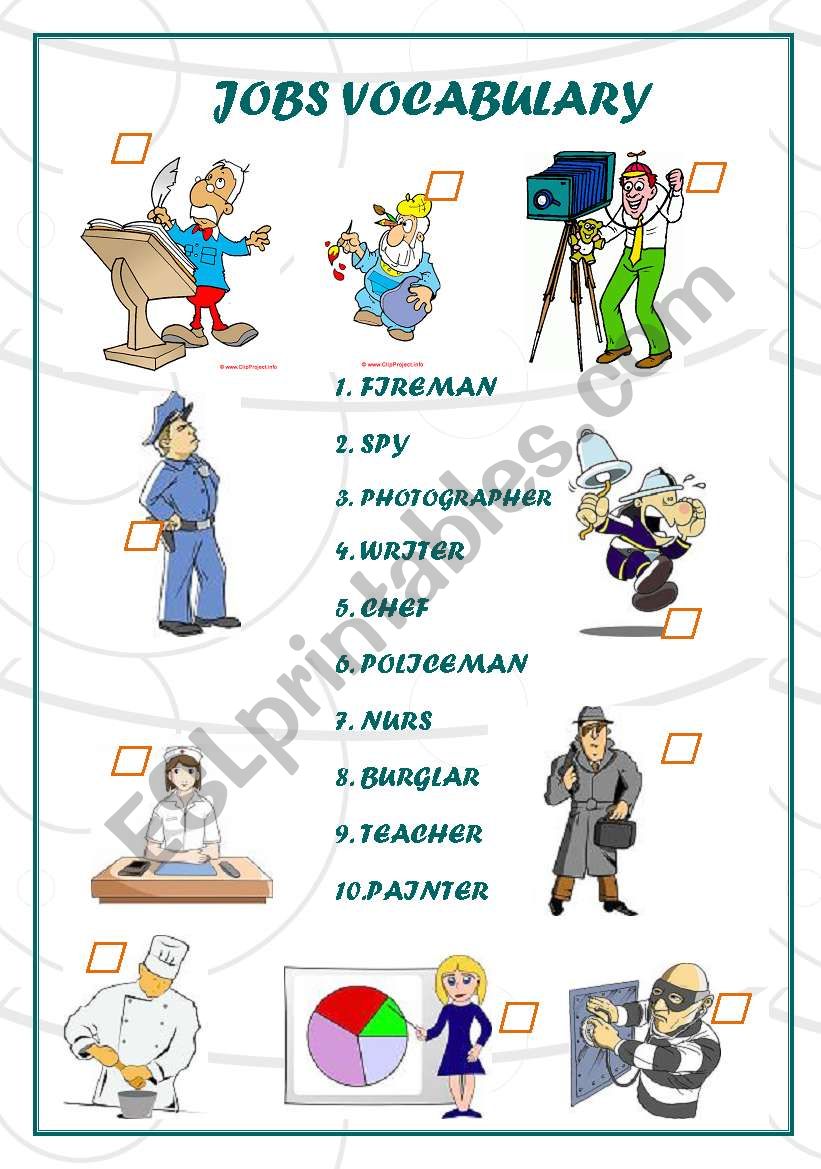
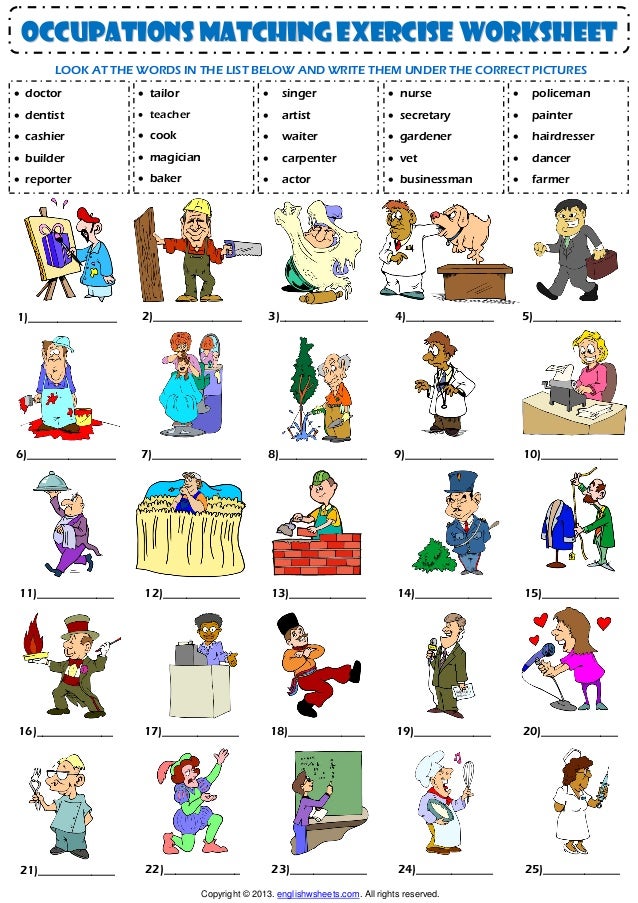
Types and Formats of Effective Job Vocabulary Worksheets
The versatility of job vocabulary worksheets allows for a wide array of formats, each designed to target different aspects of vocabulary acquisition. Here are some common and highly effective types:
-
Matching Exercises:
- Word to Definition: Learners match a job-related term (e.g., "synergy") with its definition ("the combined effect of two or more agents working together is greater than the sum of their individual effects").
- Word to Synonym/Antonym: Matching "efficient" with "productive" or "proactive" with "reactive."
- Term to Image: Useful for office equipment (e.g., "projector," "whiteboard") or job titles (e.g., "engineer," "graphic designer").
-
Fill-in-the-Blanks:
- Contextual Sentences: Learners complete sentences using appropriate job vocabulary from a word bank. Example: "Our team needs to ___ on this project to meet the deadline." (Collaborate)
- Paragraph Completion: A short professional paragraph with blanks, requiring learners to infer the correct words based on context.
-
Crosswords and Word Searches:
- These are engaging and fun ways to reinforce vocabulary. Crosswords require learners to know definitions, while word searches help with word recognition and spelling.
-
Sentence Building and Paragraph Writing:
- Using Target Words: Learners are given a set of job vocabulary words and asked to create meaningful sentences or a short paragraph demonstrating their understanding of the terms in context.
- Role-Play Prompts: Providing a scenario (e.g., a job interview, a team meeting) and a list of vocabulary words to incorporate into their dialogue.
-
Categorization and Grouping:
- Learners categorize job vocabulary words into groups such as "Job Titles," "Skills," "Office Equipment," "Interview Terms," or "Meeting Jargon." This helps in organizing knowledge semantically.
-
True/False Statements:
- Statements using job vocabulary, requiring learners to determine accuracy and correct false statements. Example: "A ‘résumé’ is typically longer than a ‘CV’." (False)
-
Discussion Prompts:
- Providing questions that require learners to use specific job vocabulary in their responses, fostering critical thinking and verbal practice. Example: "Discuss the importance of ‘soft skills’ in your desired profession, using specific examples."
-
Vocabulary Lists with Examples:
- While not an "exercise" per se, well-curated lists with clear definitions, example sentences, and common collocations serve as foundational learning material often accompanying job vocabulary worksheets.
Designing and Utilizing Job Vocabulary Worksheets for Maximum Impact
Whether you are an educator or a self-learner, thoughtful design and strategic utilization are key to maximizing the effectiveness of job vocabulary worksheets.
For Educators:
- Needs Assessment: Before designing, understand your students’ current proficiency levels, career aspirations, and specific vocabulary gaps.
- Authenticity: Use authentic materials as inspiration – real job descriptions, interview questions, business articles, or company reports.
- Variety is Key: Don’t stick to just one type of exercise. Mix matching with fill-in-the-blanks, and incorporate speaking activities based on the vocabulary.
- Contextualization: Always present new words in meaningful contexts. Avoid isolated word lists.
- Gradual Progression: Start with basic, high-frequency terms and gradually introduce more complex or specialized vocabulary.
- Integration: Don’t treat vocabulary as an isolated skill. Integrate it into reading, writing, listening, and speaking activities. Follow up a worksheet with a role-play or a discussion.
- Feedback: Provide constructive feedback on usage, not just correctness. Encourage students to keep a personal vocabulary journal.
For Self-Learners:
- Set Clear Goals: Identify the specific job or industry you’re targeting and focus on relevant vocabulary.
- Consistent Practice: Dedicate regular time to work through worksheets. Short, frequent sessions are more effective than long, sporadic ones.
- Use a Dictionary and Thesaurus: Don’t just guess. Look up definitions, synonyms, antonyms, and example sentences. Pay attention to how words are used.
- Create Your Own Sentences: After completing an exercise, try creating your own original sentences or short paragraphs using the new words.
- Practice Speaking: The ultimate goal is to use the vocabulary in real conversations. Practice saying the words aloud, use them in mock interviews, or discuss professional topics with a language partner.
- Review Regularly: Revisit completed worksheets periodically to reinforce learning. Flashcards (physical or digital) can be a great supplement.
- Immerse Yourself: Beyond worksheets, immerse yourself in English professional content: read industry news, watch business documentaries, listen to career-focused podcasts.
Beyond the Worksheet: Integrating Vocabulary into Real-World Practice
While job vocabulary worksheets are an excellent foundation, true mastery comes from applying the learned words in real-world scenarios.
- Analyze Job Advertisements: Actively dissect job ads, identifying unfamiliar terms and researching their meanings.
- Conduct Mock Interviews: Practice using the vocabulary you’ve learned in simulated interview settings. Ask a friend to play the role of an interviewer.
- Network and Connect: Attend virtual or in-person networking events. Listen carefully to how professionals speak and try to incorporate new terms into your own conversations.
- Write Professional Communications: Practice writing resumes, cover letters, professional emails, and LinkedIn profiles, consciously integrating your new vocabulary.
- Participate in Discussions: If possible, join online forums, LinkedIn groups, or professional clubs where you can discuss industry-related topics.
Conclusion
In the dynamic landscape of modern careers, language proficiency is no longer just a soft skill; it’s a core competency. The ability to articulate one’s value, understand complex professional communications, and navigate the intricacies of the workplace hinges significantly on a robust job-specific vocabulary. Job vocabulary worksheets stand out as a highly effective, versatile, and accessible tool for acquiring this crucial linguistic capital. By systematically engaging with these resources, learners can not only expand their lexicon but also build the confidence and clarity required to unlock new career opportunities and achieve lasting professional success. Embracing these worksheets is not merely about learning words; it’s about mastering the language that opens doors to a brighter professional future.
